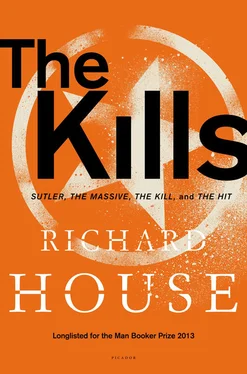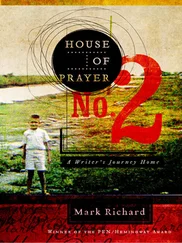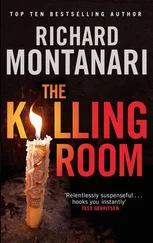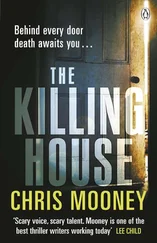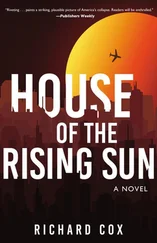Rike can’t imagine a situation in which Tomas would offer such information. She just can’t see it.
5.2
Immediately before the session Rike takes her lunch at the café opposite Tomas’s apartment.
The café is smaller and busier than she imagined, and a queue gathers at the back where a man serves from a counter of cooked meats and vegetables. The café is little more than a corridor with two high tables, six stools, and a banquette which reaches across the width of the café. Stacked beside a door stand crates of soft drinks. No more than six or eight people could eat at one time. Most, she’s happy to see, take their food out in paper-wrapped packages. Rike chooses white fish and capers and sits facing the wall and a poster of the Last Supper with local politicians and film stars replacing the disciples. Beside her two men share a plate of bread and olives.
One man stoops over the bowl and complains as he eats. His companion tears bread and shakes his head in agreement as if they are considering something of great weight, something hard to comprehend. The first man continues and gestures with the bread. For one moment Rike catches the man’s eye, but his thoughts are elsewhere and he looks through her.
Tomas is remote, she has to admit, and when he smiles it’s generally in response, as if he’s copying something he’s unable to freely volunteer. He had a family. Had. It isn’t hard to understand everything about Tomas Berens in the light of a catastrophic incident: he doesn’t socialize, and he’s distant, uninvolved. The man is remote, unmoored. The apartment shows almost no evidence of habitation yet he lives there and rarely leaves it. The kitchen, what she has seen of it, is almost bare — he can’t eat there, he almost certainly doesn’t cook. Tomas Berens has a story. She stops herself from imagining fires, car accidents, devastating incidents, domestic in nature. She can’t picture him being assaulted, or see how this has led to the loss of his family. A family means more than a wife. One child or two. Easy to imagine, Tomas with wife and child, a house somewhere, a home, a life with work, associations, club memberships, schools, habits she can only imagine. She furnishes him with such a life, which makes his current situation an intolerable void.
* * *
Up on the fourth floor Rike is hopeful that they can take the lesson outside. She doesn’t want Tomas Berens to become a collection of facts: a man managing the consequences of a serious assault, a man who has lost his family, a man adrift. As she comes up the final flight she struggles to set these thoughts aside.
Two folding chairs face each other. Beside Tomas’s chair are set out his notebook, a dictionary, and a small tin of biscuits. The balcony doors are open, and the sun reflects off the opposite building to throw a general light into the room.
Tomas holds a ticket. ‘It’s a ticket for the Cultural Centre.’
The museum is close. She knows it, of course?
He turns the ticket over and reads both sides.
‘It’s still valid.’ He offers it to her. ‘It’s a pass so it’s valid for two days.’
Rike asks what is currently showing. ‘Paintings of churches and beaches?’
‘Some. They aren’t so bad. But it’s worth going. There’s another show upstairs.’ The artists are French, he thinks, with a German name. He isn’t clear on the details. In any case it’s a group, he can’t remember the name, and you can participate in the piece, if you like, you can take part in it. He turns the ticket over again. No, the name isn’t on it.
She doesn’t go to galleries much — a small confession — in fact she isn’t much interested in art.
‘I liked it,’ he smiles. ‘Probably for the wrong reasons.’
Rike asks for an example.
Tomas insists. ‘Take the ticket. They have a booth, and you can record what you want, and they add it to the piece. I know it sounds strange. Go and see it. Tell me what you think.’
Tomas sets the ticket on her knee.
‘Practise asking me questions.’
Tomas looks down at his hands, folds them together. There are specks of white paint on the backs of his hands and forearms. ‘What is the news from your brother-in-law?’
‘He’s home.’ Rike nods and smiles.
‘So the man in the hospital no longer needs him?’
‘I think he’s stable. They are keeping him in a coma to help him recover.’
‘Is it true that he walked across the desert?’
Rike isn’t sure. It doesn’t sound feasible. ‘I don’t know. They found him in the desert. A team from Tübingen. Archaeologists from the university. He is very sick and dehydrated and he has sunburn.’ She strokes her face, her arms, gestures at her throat. ‘ Serious sunburn. It doesn’t look good. His health. It’s very bad. They want to move him, but they don’t know if he will recover.’
‘So they are waiting?’
‘So they’re waiting. And trying to find out who he really is.’
‘This is your brother-in-law’s work?’
‘Yes, this is what Henning has to find out.’ She changes the subject. ‘You have paint on your hands.’
‘I was helping Christos in the basement.’
Rike is pleased to hear this. ‘Have you decided to come to Cyprus?’
‘Not exactly. But I’m here, and doing nothing. I might as well help. If I do decide, then I will need space for storage. I haven’t thought this through properly.’
Rike doesn’t understand, and Tomas admits it isn’t exactly logical. ‘It’s something to do. And it might be useful. If I make up my mind it will make everything easier.’
Rike admits that this makes sense. ‘And perhaps this is one way to make the decision?’
Perhaps, he agrees, perhaps. ‘I haven’t told you the story about the basement.’
Rike opens her hands in invitation.
‘It isn’t pleasant.’ Tomas wipes the side of his nose. ‘Christos told me. There are rooms in the basement for storage. Sometimes they rent them out. Some are used by the residents. Four years ago two men rented one of them, and when they left they found evidence of a crime.’
‘Evidence?’
‘It’s hard to explain. But the room was lined with plastic, and sorry, it’s a little disgusting,’ he looks apologetically to Rike, ‘but the room was full of blood, and other things. Clothes, I think. But they didn’t find a body.’
Rike does not know what to say. ‘When was this?’
‘I’m not sure. It can’t have been so long ago because Christos was living here, also the doctor.’
‘And the two men?’
‘Disappeared. They have no idea who did it, or who they killed. They think that these men picked up someone from the port, but they don’t know. No one was ever reported missing.’
‘But it was a murder? How do they know?’
‘It isn’t pleasant. There was blood in the room. A lot of blood, and a tongue found outside, in a plastic bag with clothes.’
Rike sits forward with her elbows on her knees. The chairs are a little small and there is no other way to sit. He’s right, she says, the story, it isn’t so pleasant. She doesn’t know what else to say.
5.3
Sandro waits in the hotel lobby, legs crossed, he sits crooked in the seat with one arm across the shoulder. A studied look. Practised and conscious.
Gibson wants Sandro to invite him home, to extract him from the misery of shower caps, hand soaps, white towels, suitcases with wheels, double beds and hotel rooms which cannot be filled. He wants to meet the man’s wife. See how he behaves with his children. Their house will be an apartment in a palazzo, dark, chaotic, intimate, overloaded, with scents of home cooking, washing. A place noisy with neighbours, cats, dogs, children: both a pleasure and an irritation. He wants to be absorbed. He wants a stranger to be uncommonly friendly.
Читать дальше
